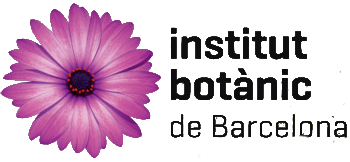Evolutionary Biology, genome organisation and plant uses
The group’s research has two focuses of interest: on the one hand, studying the changes that occur in the plant genome, including the organisation of genetic material and its biological significance, all interpreted in an evolutionary context, and on the other hand, the study of traditional plant knowledge. The IBB members of this group work in close collaboration with researchers from the Botany Laboratory (a CSIC-associated unit) of the Facultat de Farmàcia i Ciències de l’Alimentació of the Universitat de Barcelona, as well as with numerous national and international groups (www.etnobiofic.cat).
Within the first line of research, we carry out approaches focused on reconstructing the existing plant diversity in groups of interest, which basically include wild species of non-model plants and cultivated species of economic interest. The genomes are characterised and the processes that occur in them and that are the driving force of evolution are studied. The second line focuses on the study of agro-ecosystems, ethnoflora and traditional knowledge, attempting to collect popular knowledge on the uses of plants in order to preserve this heritage and to form the basis for research into obtaining new medicines and foodstuffs. The data from both lines can be integrated into multidisciplinary studies on species of biocultural and health relevance, allowing predictive models of the activity of biomolecules of interest to be established.
In the field of plant diversity and genome evolution our main goals are:
- to investigate plant diversity through the integration of data from phenotypic (including geometric morphometrics), karyologic, cytogenetic, genomic and phylogenomic approaches.
- to reconstruct the phylogenetic history in certain plant groups, analysing key factors contributing to species evolution.
- to analyse the underlying genetic basis of morphologic novelties in plants and their diversification (evo-devo studies).
- to study population dynamics from a multidisciplinary point of view (genetic, morphologic and phytochemical), with the purpose of conserving and exploiting this diversity in a sustainable way.
- to explore the models of molecular evolution and organisation of ribosomal DNA.
- to explore the processes and mechanisms that promote genomic obesity in plants through the analysis of repetitive DNA.
- to study genome size variation in relationship with ecologic, karyologic, morphologic and evolutionary parameters of species.
- to evaluate the impact of dysploidy, polyploidy, activity of transposable elements and other repetitive DNAs in the organisation and evolution of genomes.
- to analyse the genomic basis of plant invasiveness.
- to curate and analyse databases with karyologic and cytogenetic data created by our group (asteraceaegenomesize.com; www.plantrdnadatabase.com; www.bchrom.csic.es; www.sexchrom.csic.es), embracing a large number of species, as a tool for a global understanding of evolutionary processes at the genome level.
In the field of ethnobotany we aim:
- to develop ethnofloristic studies in Catalan-speaking areas, including all plant uses (medicinal, food, other) and to perform phytonymic studies.
- to conduct meta-analyses based on the above-mentioned ethnofloristic areas, focusing on either a discreet number of territories or all of them, through comparative approaches
- to study the diversity of agroecosystems and urban markets, with its associated traditional knowledge.
- to study landraces of certain crops aiming at conserving them and their associated traditional knowledge.
- to continue implementing the contents of the database etnobotanica.cat, hosted by our research group and to convert it in an open-access online resource.
- to study the traditional uses of Cannabis across its geographical distribution area, focusing particularly on ancestral varieties. To build a database of ethnobotanic information on Cannabis, including our own research outputs and available data.
- to investigate correlations between ethnobotanic knowledge and traits of interest (e.g. morphologic, biochemical, phytochemical and genetic data) from an evolutionary perspective as a way of predicting potential new medicines and other useful products.
- Towards an integrative management of invasive alien plant species in Mediterranean Sea cliffs of European interest – Programa LIFE de la Unión Europea (LIFE20 NAT/ES/001223)
- Genómica del paisaje y dinámica de nicho en plantas invasoras de origen híbrido – Agencia Estatal de Investigación-Ministerio de Ciencia e Innovación (PID2020-119163GB-I00)
- Perspectivas funcionales y evolutivas en biología de la reproducción: el capítulo de las Asteraceae como sistema modelo – Agencia Estatal de Investigación-Ministerio de Ciencia e Innovación (PID2020-116480GB-I00).













